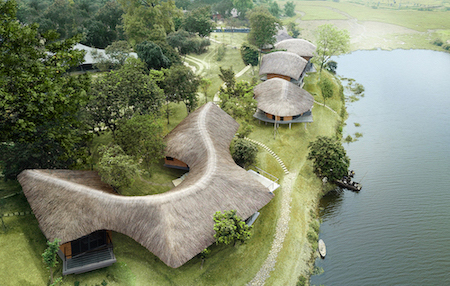FGLA 2020 Award: Jackfruit Village
June 1, 2020
Surrounded by a lake in the south and southwest, the existing development site is home to 38 jackfruit trees and 13 pomelo trees, typical of rural areas in northern Vietnam. The main idea was to have the nucleus of the project—the ancestral house that will serve as a place of worship and meditation as well asa community space—to be located in the centre, and the residential units spreading out from the middle, hugging close to the surrounding trees, and making the most of the shade for the common yards. Based on the topography, the ground floors are elevated to avoid pests like termites, reduce humidity and allow for natural surface drainage.

Living spaces are arranged according to the landscape and vegetation, closely associated with nature. Applying a VAC model (VAC in Vietnamese stands for vuon, ao, chuong that means garden, pond, livestock pen) with an existing fruit-tree garden and cage fish farming along with a livestock farm, it is able to supply clean, organic food in abundance for the workers and users during the whole process, from construction to operation. The project uses a five-chamber septic tank and wetlands technology to treat waste water for irrigation and toilet. The ecosystems create a closed cycle that can be self-sufficient, renewable and maintainable in the long term.
Previously published in FuturArc 1Q 2019 issue.
JURORS’ COMMENTS
Dr Nirmal Kishnani: Many architects romanticise the vernacular. However, the author of this development shows us how to adapt old ideas to new realities, without lapsing into clichés. Made from low impact and local materials, such as bamboo and thatched roofs, this is unmistakably modern in the way the form of the roof sweeps and curves across the site. There is also evidence of environmental intent, in particular the management of water as it flows from building to lake and vice versa.
Prof Herbert Dreiseitl: What a beautiful design and well-integrated setting. Jackfruit Village is sensitive and intelligent in a fascinating landscape in Vietnam. The jury was impressed by the well formulated balance between modern architecture and ecologically respectful integrated design. This entry works with the topic of tolerance towards nature, towards all creatures and encourages tolerance between guests and visitors. It has a thoughtful and well-planned concept from the general layout to the spatial design; it is truly peaceful and friendly. Who wouldn’t like to spend some time there?
Prof Chrisna du Plessis: This wellness retreat provides a biophilic sanctuary that is deeply embedded in its context. The use of traditional building techniques and locally sourced, natural building materials to craft bungalows that curve around existing trees, not only reduced the carbon footprint of the project, but also makes the project very much a product of its place.
Check out the submission panels here!
PROJECT DATA
Project Name: Jackfruit Village
Location: Co Dong commune, Son Tay district, Hanoi, Vietnam
Completion Date: 18 August 2019
Site Area: 17,000 square metres
Gross Floor Area: 1,598 square metres
Number of Rooms: 30 rooms
Building Height: 2 levels
Client/Owner: Tran Manh Hung
Architecture Firm: 1+1>2 Architects
Principal Architect: Hoang Thuc Hao
Main Contractor: Kien Architects
Mechanical & Electrical Engineer: Le Xuan Vuong
Civil & Structural Engineer: Nguyen Hong Chuong
Landscape Architect: Vuong Dao Hoang
Environmental Consultant: Le Dinh Hung
Photos/Images: Son Vu; Manh Duong Van

To read the complete article, get your hardcopy at our online shop/newsstands/major bookstores; subscribe to FuturArc or download the FuturArc App to read the issues.
